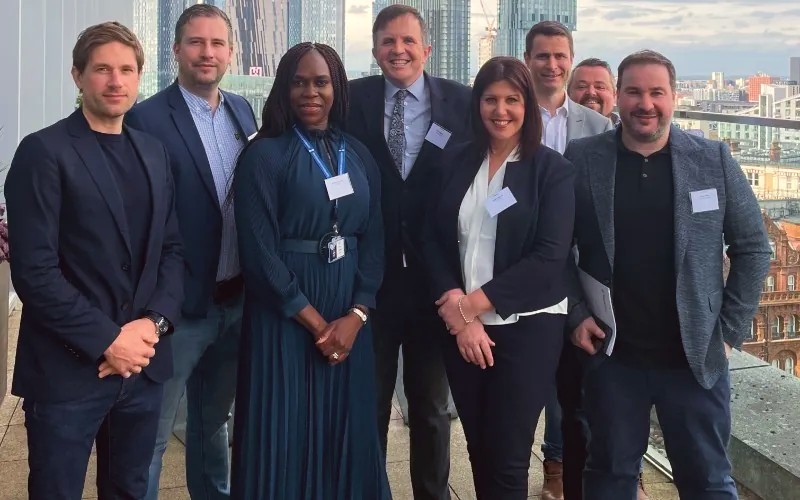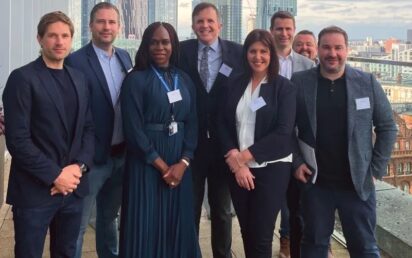Award-winning recruitment technology provider Talos360 has published its exclusive research on the future of hiring.
The LDC-backed tech firm teamed up with BusinessCloud to launch its ‘Future of Talent’ report at the Manchester offices of KPMG.
The research highlighted a number of issues around talent retention, the importance of flexible working and the growth in artificial intelligence within recruitment.
Talos360’s award-winning CEO, Janette Martin, said: “The people retention issues really come out of the report. 96 per cent of hiring managers are saying their businesses face people challenges and almost half of them are saying that’s down to people retention.
“74 per cent of job seekers are saying that flexible working is really important to them. In the 25-34 age bracket that goes up to 82 per cent. It’s also telling us that’s even more important for females as it for males.
“For those of us who want to attract and have the benefits of a diverse workforce that’s really important to know so that our people strategies can be aligned to the things that are most important to keeping that talent.”
Censuswide were commissioned to carry out the research and quizzed more than 1,000 employees and 251 hiring managers.
Martin said the growing impact of AI in generating CVs and applications was a challenge for hiring managers.
“Without the right software in place that could be a massively overwhelming task,” she said. “From an employee’s perspective, at the end of the day we’re making people decisions here. AI should make us become more efficient and aid us make those decisions rather than make those decisions for us.”
Dean McGlone, chief revenue officer of Talos360, said employers needed to guard against the ‘AI candidate’.
“For me AI isn’t going anywhere,” he said. “More and more candidates, over time, are going to start using technology and employers need to embrace that reality.
“We are going to have to find different ways to differentiate quality of candidates. If every CV that comes through is brilliant you can’t feasibly interview all 100 candidates so you have to think about ways to filter that 100 down in a way that is unbiased and ensures that we hire the right candidates.”
Senda Kavindele is an office senior partner at KPMG and a director of ESG / inclusion / diversity / equity. She said diverse workforces were good for business.
“Evidence-backed research reinforces the business case for a diverse and inclusive workforce,” she said. “Employees from under-represented backgrounds create value for the unique skills, perspectives and experience that they bring to the workplace.
“Ultimately, they drive innovation, growth, increase financial performance and boost your social capital. A sustainable business is less likely to thrive if it harnesses exclusionary practices.
“There’s a strong correlation between innovation and profitability. Businesses that are diverse are 70 per cent more likely to capture new markets, outperform their peers and have a stronger competitive advantage.
“15-20 per cent of the population is neurodiverse and it’s growing. This is a talent pool that can no longer be excluded. The benefits far outweigh the risks particularly in the context of IT skills and the unique attributes they bring to the table.”
The research also found that 51 per cent of candidates said no mention of salary would deter them from applying.
Simon Swan is the founder of Manchester-based talent marketplace Hiring Hub and said it was a huge disadvantage if employers didn’t disclose a salary. “What candidate is going to waste their time exploring a new opportunity if they don’t know whether it’s in their salary ballpark?” he asked.
Adam Ward is the CEO of Airtime Rewards, which employs 85 staff and is targeting £37m turnover this year.
Airtime Rewards doesn’t publish salaries but does offer bi-annual salary reviews and hybrid working.
He said: “We’ve changed our ways of finding candidates in the last 12-18 months. We’ve become a lot more direct. We’ve become a lot more known as an employers in Manchester and London.
“We invested in our HR function 18 months ago and brought people in to run our recruitment. We’ve been able to benefit from having somebody on it full time.
“We actually get most of our candidates through into our process by LinkedIn by having that first conversation with them. Prior to that it was through a recruiter. We’re getting a lot of interest for our roles.”
Talos360’s research also found 48 per cent of candidates said they disliked filling in lengthy application forms.
Simon Gomez, founder and director of GMZ Talent, said: “During my tenure as head of talent acquisition and employer brand at wagamama, we made a strategic decision to move away from mandatory CVs and cumbersome application forms.
“Instead, we embraced a more conversational and chat-based approach to applications. This shift not only improved the candidate experience but also allowed us to gather more relevant information about the applicants’ skills, experiences, and personality.”
Adam Newey, head of customer development at Manchester-based Collctiv, said a ‘one hat fits all’ approach didn’t work in recruitment.
He said: “As a tech business, a lot of the talent we have brought in and are keen to attract for the future are developers, product managers and growth experts.
“Having previously been in agency recruitment for eight years it’s been very interesting seeing the landscape alter – employer branding remains incredibly important, but the way of establishing that is much more multi-faceted than previously.
“Recruitment processes have needed to change and in many respects the ‘balance of power’ has altered (for the better) to be weighted on the candidate-side rather than the company-side.”
The event was hosted by BusinessCloud’s executive editor Chris Maguire.


